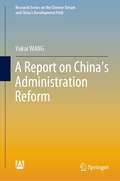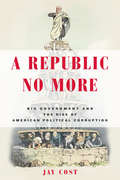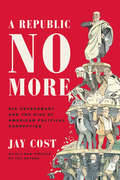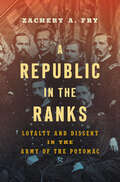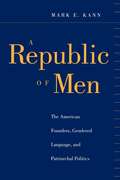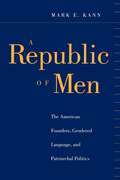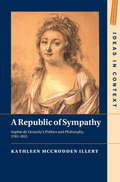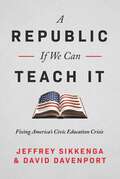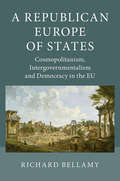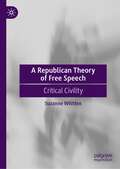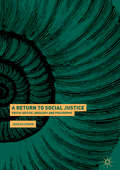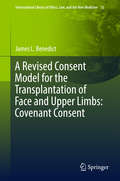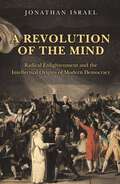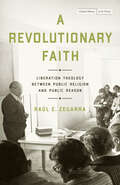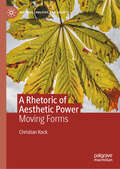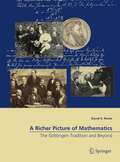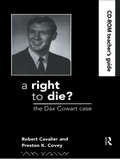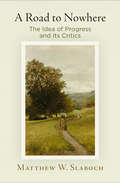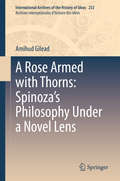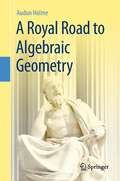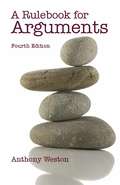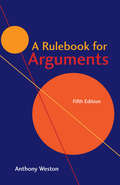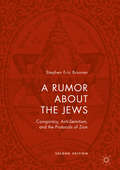- Table View
- List View
A Report on China’s Administration Reform (Research Series on the Chinese Dream and China’s Development Path)
by Yukai WANGThis book traces the history of China’s administrative reform in the past 35 years, focusing on the three phases of development, four guidelines and five major tasks of the reform since it is of great value to depict the entire process of China’s administrative system reform, analyzing the achievements, problems and prospects of the reform, and exploring experiences and lessons from the relationship between the administrative system reform and China’s economic, social and government transformation.
A Republic No More
by Jay CostAfter the Constitutional Convention, Benjamin Franklin was asked, "Well, Doctor, what have we got-a Republic or a Monarchy?" Franklin's response: "A Republic-if you can keep it."This book argues: we couldn't keep it.A true republic privileges the common interest above the special interests. To do this, our Constitution established an elaborate system of checks and balances that separates power among the branches of government, and places them in conflict with one another. The Framers believed that this would keep grasping, covetous factions from acquiring enough power to dominate government. Instead, only the people would rule.Proper institutional design is essential to this system. Each branch must manage responsibly the powers it is granted, as well as rebuke the other branches when they go astray. This is where subsequent generations have run into trouble: we have overloaded our government with more power than it can handle. The Constitution's checks and balances have broken down because the institutions created in 1787 cannot exercise responsibly the powers of our sprawling, immense twenty-first century government.The result is the triumph of special interests over the common interest. James Madison called this factionalism. We know it as political corruption.Corruption today is so widespread that our government is not so much a republic, but rather a special interest democracy. Everybody may participate, yes, but the contours of public policy depend not so much on the common good, but rather the push-and-pull of the various interest groups encamped in Washington, DC.
A Republic No More: Big Government and the Rise of American Political Corruption
by Jay CostAfter the Constitutional Convention, Benjamin Franklin was asked, "Well, Doctor, what have we got-a Republic or a Monarchy?" Franklin's response: "A Republic-if you can keep it."This book argues: we couldn't keep it.A true republic privileges the common interest above the special interests. To do this, our Constitution established an elaborate system of checks and balances that disperses power among the branches of government, which it places in conflict with one another. The Framers believed that this would keep grasping, covetous factions from acquiring enough power to dominate government. Instead, only the people would rule.Proper institutional design is essential to this system. Each branch must manage responsibly the powers it is granted, as well as rebuke the other branches when they go astray. This is where subsequent generations have run into trouble: we have overloaded our government with more power than it can handle. The Constitution's checks and balances have broken down because the institutions created in 1787 cannot exercise responsibly the powers of our sprawling, immense twenty-first-century government.The result is the triumph of special interests over the common interest. James Madison called this factionalism. We know it as political corruption.Corruption today is so widespread that our government is not really a republic, but rather a special interest democracy. Everybody may participate, yes, but the contours of public policy depend not so much on the common good, as on the push-and-pull of the various interest groups encamped in Washington, DC.
A Republic in the Ranks: Loyalty and Dissent in the Army of the Potomac (Civil War America)
by Zachery A. FryThe Army of the Potomac was a hotbed of political activity during the Civil War. As a source of dissent widely understood as a frustration for Abraham Lincoln, its onetime commander, George B. McClellan, even secured the Democratic nomination for president in 1864. But in this comprehensive reassessment of the army's politics, Zachery A. Fry argues that the war was an intense political education for its common soldiers. Fry examines several key crisis points to show how enlisted men developed political awareness that went beyond personal loyalties. By studying the struggle between Republicans and Democrats for political allegiance among the army's rank and file, Fry reveals how captains, majors, and colonels spurred a pro-Republican political awakening among the enlisted men, culminating in the army's resounding Republican voice in state and national elections in 1864.For decades, historians have been content to view the Army of the Potomac primarily through the prism of its general officer corps, portraying it as an arm of the Democratic Party loyal to McClellan's leadership and legacy. Fry, in contrast, shifts the story's emphasis to resurrect the successful efforts of proadministration junior officers who educated their men on the war's political dynamics and laid the groundwork for Lincoln's victory in 1864.
A Republic of Men: The American Founders, Gendered Language, and Patriarchal Politics
by Mark E. KannWhat role did manhood play in early American Politics? In A Republic of Men, Mark E. Kann argues that the American founders aspired to create a "republic of men" but feared that "disorderly men" threatened its birth, health, and longevity. Kann demonstrates how hegemonic norms of manhood–exemplified by "the Family Man," for instance--were deployed as a means of stigmatizing unworthy men, rewarding responsible men with citizenship, and empowering exceptional men with positions of leadership and authority, while excluding women from public life. Kann suggests that the founders committed themselves in theory to the democratic proposition that all men were created free and equal and could not be governed without their own consent, but that they in no way believed that "all men" could be trusted with equal liberty, equal citizenship, or equal authority. The founders developed a "grammar of manhood" to address some difficult questions about public order. Were America's disorderly men qualified for citizenship? Were they likely to recognize manly leaders, consent to their authority, and defer to their wisdom? A Republic of Men compellingly analyzes the ways in which the founders used a rhetoric of manhood to stabilize American politics.
A Republic of Men: The American Founders, Gendered Language, and Patriarchal Politics
by Mark E. KannWhat role did manhood play in early American Politics? In A Republic of Men, Mark E. Kann argues that the American founders aspired to create a "republic of men" but feared that "disorderly men" threatened its birth, health, and longevity. Kann demonstrates how hegemonic norms of manhood–exemplified by "the Family Man," for instance--were deployed as a means of stigmatizing unworthy men, rewarding responsible men with citizenship, and empowering exceptional men with positions of leadership and authority, while excluding women from public life. Kann suggests that the founders committed themselves in theory to the democratic proposition that all men were created free and equal and could not be governed without their own consent, but that they in no way believed that "all men" could be trusted with equal liberty, equal citizenship, or equal authority. The founders developed a "grammar of manhood" to address some difficult questions about public order. Were America's disorderly men qualified for citizenship? Were they likely to recognize manly leaders, consent to their authority, and defer to their wisdom? A Republic of Men compellingly analyzes the ways in which the founders used a rhetoric of manhood to stabilize American politics.
A Republic of Sympathy: Sophie de Grouchy's Politics and Philosophy, 1785–1815 (Ideas in Context)
by Kathleen McCrudden IllertSophie de Grouchy was a political philosopher and activist practising at the centre of Revolutionary events in France between 1789 and 1815. Despite this, her contributions to the development of political thought are often overlooked, with Grouchy commonly falling under the shadow of her husband Nicolas de Caritat, the marquis de Condorcet. A Republic of Sympathy instead situates Grouchy as a significant figure among her contemporaries, offering the first complete exploration of her shifting thought and practice across this period of societal upheaval. Kathleen McCrudden Illert analyses texts newly attributed to Grouchy and examines her intellectual collaborations, demonstrating how Grouchy continued to develop a unique philosophy which placed sympathy as the glue between the individual and the political community. The study also explores Grouchy's connections with her peers and interlocutors, from Adam Smith and Jean-Jacques Rousseau, to Thomas Paine and Jacques Pierre Brissot. In doing so, it argues powerfully for Grouchy's reintegration into the history of European political thought.
A Republic, If We Can Teach It: Fixing America's Civic Education Crisis
by David Davenport Jeffrey SikkengaAmerica faces a crisis in civic education that imperils the long-term health of our country. Too many Americans—especially young people—do not have the knowledge of our history and principles necessary to sustain our republic.Recent national test results reveal the sad state of civic education in our schools. The 2022 report of the National Assessment of Educational Progress showed that only 22 percent of eighth graders tested were &“proficient&” or better in their knowledge of civics, and proficiency in US history dropped to an anemic 13 percent. The Annenberg Policy Center reported in 2019 that only 39 percent of Americans could name the three branches of government, while its 2017 study showed that 37 percent could not name a single right in the First Amendment. How can we &“keep&” a republic, as Benjamin Franklin put it, if we don&’t know what a republic is? At a deeper level, the crisis is not simply about facts and information. If the next generations of Americans do not come to understand that our history and principles are good and that they merit their affection, our experiment in self-government could fail. Action is needed now to reverse the trend.
A Republican Europe of States: Cosmopolitanism, Intergovernmentalism and Democracy in the EU
by Richard BellamyCombining international political theory and EU studies, Richard Bellamy provides an original account of the democratic legitimacy of international organisations. He proposes a new interpretation of the EU's democratic failings and how they might be addressed. Drawing on the republican theory of freedom as non-domination, Bellamy proposes a way to combine national popular sovereignty with the pursuit of fair and equitable relations of non-domination among states and their citizens. Applying this approach to the EU, Bellamy shows that its democratic failings lie not with the democratic deficit at the EU level but with a democratic disconnect at the member state level. Rather than shifting democratic authority to the European Parliament, this book argues that the EU needs to reconnect with the different 'demoi' of the member states by empowering national parliaments in the EU policy-making process.
A Republican Theory of Free Speech: Critical Civility
by Suzanne WhittenThis book offers the first comprehensive philosophical examination of the free speech ‘battles’ of the last decade, arguing for a critical republican conception of civility as an explanatory and prescriptive solution. Issues such as no-platforming and safe spaces, the increasing influence of Far-Right rhetoric on internet forums, the role of Twitter as a site of activist struggles, and the moral panics that surround ill-judged comments made by public figures, all provide a new set of challenges for society which demand a careful critical analysis. The author proposes a 'republican theory' of free speech, demonstrating how a conception of ‘critical’ civility, one which combines the importance of expressive respect with the responsibilities of contestation and vigilance, is required if we are to combat some of the most contentious speech-related conflicts facing contemporary society today.
A Return to Common Sense: How to Fix America Before We Really Blow It
by Leigh McGowanA political book for non-political people from viral TikTok sensation PoliticsGirl. Something&’s gone wrong in the Land of the Free and the Home of the Brave. We can all feel it, but if we&’re being honest, most of us don&’t understand it. At the end of the day, we don&’t have all the facts, and if you don&’t know how something works, how do you fix it? A Return to Common Sense is a concise, no-nonsense, dare we say fun, guide to how America works and a roadmap to reclaiming a government of, by, and for the people. If we truly want to be a land of freedom and opportunity where everyone has a shot at a good life, we must acknowledge the ideals of America are in danger, but worth saving. We fought a revolutionary war for the idea of self-governance and pursuit of happiness—we can&’t just give up on it now. To address the crisis, Leigh McGowan offers Six American Principles. Six ideals, rooted in history, that we can all agree make America, America. 1. America is a land of freedom. 2. Everyone should have the opportunity to rise. 3. Every citizen should have a vote, and that vote should count. 4. Representatives should represent the people who elected them. 5. The law applies to all of us. 6. Government should be a force for good. Using the Six Principles as guideposts, this book will lay out suggestions for America, to not only find its way out of the mess it&’s currently in, but to set a course for a future of which we can all be truly proud. It&’s time to find the courage to step out of our comfort zones and off our team benches to reboot America. If we start here, we start strong. We can fix this, but the way forward starts with understanding.
A Return to Social Justice: Youth Justice, Ideology And Philosophy
by Jessica UrwinYouth justice has always focused on criminal justice but this work argues that taking a social justice approach is the best way to reduce youth crime. Drawing on philosophy, new research, and practitioners’ views, a new organizational structure and approach is developed. Urwin outlines the philosophical and historical background of youth justice and clarifies how this has led to problems within current practice. Prominent debates within the field are also explored in depth, such as care vs. control, and the issue of professional identity. Ultimately, all of these factors are considered in relation to the organizational structure of youth justice, and this bold and engaging study highlights the need for a more principled approach to practice. Timely and authoritative, this book is will be of great interest to youth justice practitioners, academics, students, and those who would like to apply social justice to social institutions.
A Revised Consent Model for the Transplantation of Face and Upper Limbs: Covenant Consent (International Library of Ethics, Law, and the New Medicine #73)
by James L. BenedictThis book supports the emerging field of vascularized composite allotransplantation (VCA) for face and upper-limb transplants by providing a revised, ethically appropriate consent model which takes into account what is actually required of facial and upper extremity transplant recipients. In place of consent as permission-giving, waiver, or autonomous authorization (the standard approaches), this book imagines consent as an ongoing mutual commitment, i. e. as covenant consent. The covenant consent model highlights the need for a durable personal relationship between the patient/subject and the care provider/researcher. Such a relationship is crucial given the recovery period of 5 years or more for VCA recipients. The case for covenant consent is made by first examining the field of vascularized composite allotransplantation, the history and present understandings of consent in health care, and the history and use of the covenant concept from its origins through its applications to health care ethics today. This book explains how standard approaches to consent are inadequate in light of the particular features of facial and upper limb transplantation. In contrast, use of the covenant concept creates a consent model that is more appropriate ethically for these very complex surgeries and long-term recoveries.
A Revolution of the Mind: Radical Enlightenment and the Intellectual Origins of Modern Democracy
by Jonathan IsraelA leading historian reveals the radical origins of humanity's most cherished secular valuesDemocracy, free thought and expression, religious tolerance, individual liberty, political self-determination of peoples, sexual and racial equality—these values have firmly entered the mainstream in the decades since they were enshrined in the 1948 U.N. Declaration of Human Rights. But if these ideals no longer seem radical today, their origin was very radical indeed—far more so than most historians have been willing to recognize. In A Revolution of the Mind, Jonathan Israel, one of the world's leading historians of the Enlightenment, traces the philosophical roots of these ideas to what were the least respectable strata of Enlightenment thought—what he calls the Radical Enlightenment.Originating as a clandestine movement of ideas that was almost entirely hidden from public view during its earliest phase, the Radical Enlightenment matured in opposition to the moderate mainstream Enlightenment dominant in Europe and America in the eighteenth century. During the revolutionary decades of the 1770s, 1780s, and 1790s, the Radical Enlightenment burst into the open, only to provoke a long and bitter backlash. A Revolution of the Mind shows that this vigorous opposition was mainly due to the powerful impulses in society to defend the principles of monarchy, aristocracy, empire, and racial hierarchy—principles linked to the upholding of censorship, church authority, social inequality, racial segregation, religious discrimination, and far-reaching privilege for ruling groups.In telling this fascinating history, A Revolution of the Mind reveals the surprising origin of our most cherished values—and helps explain why in certain circles they are frequently disapproved of and attacked even today.
A Revolutionary Faith: Liberation Theology Between Public Religion and Public Reason (Cultural Memory in the Present)
by Raúl E. ZegarraReligious commitments can be a powerful engine for progressive social change, and in this new book, Raúl E. Zegarra examines the process of articulation of religious beliefs and political concerns that takes place in religious organizing and activism. Focusing on the example of Latin American liberation theology and the work of Peruvian theologian Gustavo Gutiérrez, Zegarra shows how liberation theology advocates have been able to produce a new balance between faith and politics that advances an agenda of progressive social change without reducing politics to faith or faith to politics. Drawing from theologian David Tracy's method of critical correlation, the book focuses on key historical, philosophical, and theological shifts that have allowed liberation theologians to produce a new interpretation of the relationship between faith and politics in the Christian tradition, especially when issues of social justice are at stake. The book further approaches liberation theology's contributions to theorizing social justice through an unconventional path: a critical dialogue with the work of philosopher John Rawls. This dialogue, as Zegarra contends, allows us to see more clearly the contributions of liberation theology to the cause of progressive social change. Ultimately the book stands between "public religion" and "public reason," offering something of a blueprint for theological innovation and for how to remain committed to one's faith while respecting and defending the core values of democracy.
A Rhetoric of Aesthetic Power: Moving Forms (Rhetoric, Politics and Society)
by Christian KockThis book offers a theory of those formal properties of art that are apt to afford strong aesthetic experience – a project resembling Aristotle’s in the Poetics, where he analysed structures in tragedies that condition the “peculiar pleasure” of tragedy. However, the book’s scope cuts across all genres of literature and also includes classical music – the formal art par excellence. Drawing on a wide array of recent theoretical work and empirical evidence, the book closely analyses dozens of examples of both art forms. Besides Aristotle, major inspiration comes from two modern master thinkers: the linguist Roman Jakobson, who defined the “poetic function” of language, and the rhetorician Kenneth Burke, who proposed a “psychological” concept of form. Throughout, the book argues for aesthetic experience as an end in itself and a component of quality of life, one to which everyone should have access – rather than just a means to other ends.
A Richer Picture of Mathematics: The Göttingen Tradition and Beyond
by David E. RoweHistorian David E. Rowe captures the rich tapestry of mathematical creativity in this collection of essays from the “Years Ago” column of The Mathematical Intelligencer. With topics ranging from ancient Greek mathematics to modern relativistic cosmology, this collection conveys the impetus and spirit of Rowe’s various and many-faceted contributions to the history of mathematics. Centered on the Göttingen mathematical tradition, these stories illuminate important facets of mathematical activity often overlooked in other accounts. Six sections place the essays in chronological and thematic order, beginning with new introductions that contextualize each section. The essays that follow recount episodes relating to the section’s overall theme. All of the essays in this collection, with the exception of two, appeared over the course of more than 30 years in The Mathematical Intelligencer. Based largely on archival and primary sources, these vignettes offer unusual insights into behind-the-scenes events. Taken together, they aim to show how Göttingen managed to attract an extraordinary array of talented individuals, several of whom contributed to the development of a new mathematical culture during the first decades of the twentieth century.
A Right to Die?: Teachers Guide
by David Andersen Robert Cavalier Preston CoveyA 96 page guide to the background, program, uses for and contact time needed with the CD-ROM A Right to Die? The Dax Cowart Case. This guide is supplied free with every multi-user copy of the CD-ROM, and will prove invaluable for all those planning to use the program in a classroom setting. This guide is not available to purchase separately.
A Road to Nowhere: The Idea of Progress and Its Critics
by Matthew W. SlabochSince the Enlightenment, the idea of progress has spanned right- and left-wing politics, secular and spiritual philosophy, and most every school of art or culture. The belief that humans are capable of making lasting improvements—intellectual, scientific, material, moral, and cultural—continues to be a commonplace of our age. However, events of the preceding century, including but not limited to two world wars, conflicts in Korea and Vietnam, the spread of communism across Eastern Europe and parts of Asia, violent nationalism in the Balkans, and genocides in Cambodia and Rwanda, have called into question this faith in the continued advancement of humankind.In A Road to Nowhere, Matthew W. Slaboch argues that political theorists should entertain the possibility that long-term, continued progress may be more fiction than reality. He examines the work of German philosophers Arthur Schopenhauer and Oswald Spengler, Russian novelists Leo Tolstoy and Aleksandr Solzhenitsyn, and American historians Henry Adams and Christopher Lasch—rare skeptics of the idea of progress who have much to engage political theory, a field dominated by historical optimists. Looking at the figures of Schopenhauer, Tolstoy, and Adams, Slaboch considers the ways in which they defined progress and their reasons for doubting that their cultures, or the world, were progressing. He compares Germany, Russia, and the United States to illustrate how these nineteenth-century critics of the idea of progress contributed to or helped forestall the emergence of forms of government that came to be associated with each country: fascism, communism, and democratic capitalism, respectively.Turning to Spengler, Solzhenitsyn, and Lasch, Slaboch explores the contemporary relevance of the critique of progress and the arguments for and against political engagement in the face of uncertain improvement, one-way inevitable decline, or unending cycles of advancement and decay. A Road to Nowhere concludes that these notable naysayers were not mere defeatists and presents their varied prescriptions for individual and social action.
A Rose Armed with Thorns: Spinoza’s Philosophy Under a Novel Lens (International Archives of the History of Ideas Archives internationales d'histoire des idées #232)
by Amihud GileadThis book presents a systemic analysis of Spinoza’s philosophy and challenges the traditional views. It deals with Spinoza’s concepts of substance, truth conditions, attributes, and the first, second, and supreme grades of knowledge. Based upon an analysis of the relevant details in all of Spinoza’s philosophical works, the book reveals many important points, including the following: Spinoza’s system is not, nor is meant to be, a foundational-deductive system but was meant to be a coherent system of a network model. Spinoza’s reality is not made in the image of a mathematical model. Imaginatio, the first grade of knowledge, and ratio, the second grade, are parts or properties of the supreme grade of knowledge, scientia intuitiva, which is their essence. Finite beings, especially humans, are necessary and eternal (unless they are mistakenly perceived by imaginatio) whereas time, place, and death are simply “entities of imagination.” The salvation, happiness, and blessedness that Spinoza’s Ethics offers us, are active and depend only upon us. Concluding a careful examination and interpretation, the book suggests additional novel viewpoints in interpreting Spinoza’s philosophical psychology and political philosophy.
A Royal Road to Algebraic Geometry
by Audun HolmeThis book is about modern algebraic geometry. The title A Royal Road to Algebraic Geometry is inspired by the famous anecdote about the king asking Euclid if there really existed no simpler way for learning geometry, than to read all of his work Elements. Euclid is said to have answered: "There is no royal road to geometry!" The book starts by explaining this enigmatic answer, the aim of the book being to argue that indeed, in some sense there is a royal road to algebraic geometry. From a point of departure in algebraic curves, the exposition moves on to the present shape of the field, culminating with Alexander Grothendieck's theory of schemes. Contemporary homological tools are explained. The reader will follow a directed path leading up to the main elements of modern algebraic geometry. When the road is completed, the reader is empowered to start navigating in this immense field, and to open up the door to a wonderful field of research. The greatest scientific experience of a lifetime!
A Rulebook for Arguments
by Anthony WestonA Rulebook for Arguments is a succinct introduction to the art of writing and assessing arguments, organized around specific rules, each illustrated and explained soundly but briefly. This widely popular primer--translated into eight languages--remains the first choice in all disciplines for writers who seek straightforward guidance about how to assess arguments and how to cogently construct them.The fourth edition offers a revamped and more tightly focused approach to extended arguments, a new chapter on oral arguments, and updated examples and topics throughout.
A Rulebook for Arguments
by Anthony WestonFrom academic writing to personal and public discourse, the need for good arguments and better ways of arguing is greater than ever before. This timely fifth edition of A Rulebook for Arguments sharpens an already-classic text, adding updated examples and a new chapter on public debates that provides rules for the etiquette and ethics of sound public dialogue as well as clear and sound thinking in general.
A Rumor about the Jews: Reflections On Antisemitism And The Protocols Of The Learned Elders Of Zion
by Stephen Eric BronnerIn its portrayal of Judaism as a worldwide conspiracy dedicated to the destruction of Christian civilization, the Protocols of the Learned Elders of Zion remains one of the most infamous documents ever written. Despite being proven a crude forgery, the pamphlet managed to pervade twentieth-century thinking, often being twisted to suit its handlers' purposes, and to justify the most extreme persecution of the Jews. In A Rumor About the Jews, Stephen Eric Bronner provides a history of this notorious fabrication—one which has renewed salience in a “post truth” society dominated by “fake news"—and explores its influence on right-wing movements throughout the twentieth century and the ongoing appeal of bigotry. This new edition of Bronner's 2000 classic (described by Kirkus as "the best short book on anti-Semitism") expands the arguments of the first edition, bringing the work up to date in a new political context.
A Sceptical Guide to Meaning and Rules: Defending Kripke's Wittgenstein
by Martin KuschNo other recent book in Anglophone philosophy has attracted as much criticism and has found so few friends as Saul Kripke's "Wittgenstein on Rules and Private Language". Amongst its critics, one finds the very top of the philosophical profession. Yet, it is rightly counted amongst the books that students of philosophy, at least in the Anglo-American world, have to read at some point in their education. Enormously influential, it has given rise to debates that strike at the very heart of contemporary philosophy of mind and language. In this major new interpretation, Martin Kusch defends Kripke's account against the numerous weighty objections that have been put forward over the past twenty years and argues that none of them is decisive. He shows that many critiques are based on misunderstandings of Kripke's reasoning; that many attacks can be blocked by refining and developing Kripke's position; and that many alternative proposals turn out either to be unworkable or to be disguised variants of the view they are meant to replace. Kusch argues that the apparent simplicity of Kripke's text is deceptive and that a fresh reading gives Kripke's overall argument a new strength.
